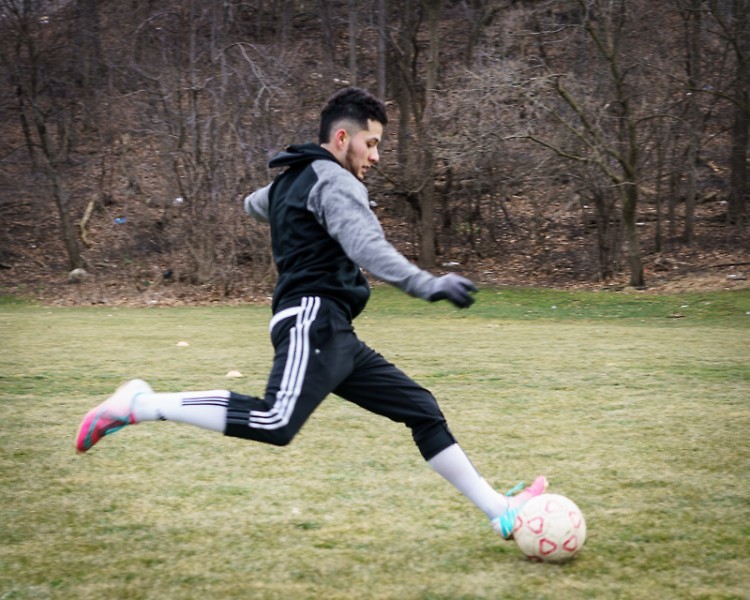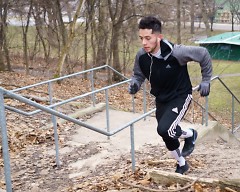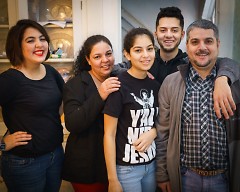It’s an overcast February day at Clemente Park. The late winter thaw has melted the snow revealing the dull, listless grass. A young man in sweats pulls up in a faded black Nissan Sentra and begins to pull some gear out of the back seat. Ernesto Pulido is tall and lean with flowing wavy hair, cut close on the sides and in the beard. He pulls out some ragged pink Nikes and meticulously laces them up. “I really don’t like to change shoes,” he explains. Typical of many athletes, he’s particular about keeping his gear unchanged.
Pulido is here for his solitary training session. He trains for an hour in the morning, and then again in afternoon. But there’s no team, no school, and no job. This not by bad luck or laziness. No, Pulido has made a tough decision to leave his engineering program at Ferris State University to travel to Mexico to accept an invitation from a professional Mexican team, and follow the unlikely dream of a career in professional soccer.
This story is inseparable from this place: this traditional gateway immigrant neighborhood with its school, its empty factory buildings, parks, churches and Mexican grocery stores. Together they form a solid neighborhood of support.
It started up on Grandville Avenue. Pulido’s parents made their break to come from Mexico to the United States in the 1990s with an infant girl, Yadira. They found work in the factories of Grand Rapids and set down their roots here. They added to their family, first Ernesto and finally, his younger sister, Yasmín.
It was here at Southwest Academy that his father encouraged him to joint the 4th grade indoor soccer team led by volunteer coach, José Castillo. Pulido was chubby, slow and soft. His team put him in the goalie position because he was too slow. He felt discouraged. “I’m too slow, too fat, with so little chance of ever being any good,” he recalls thinking. But Pulido’s father’s love of soccer was infectious, and like most boys, Pulido needed his father’s approval.
So he kept playing. But he also knew that things were not easy at home. His father worked long hours and his mother worked third shift. It was hard for Pulido and the girls to sleep while his mom was away working at night. Despite Yadira’s turn at being substitute mother, the younger two tossed and turned and stayed up much of the night, waiting for their mother to arrive home. Once she arrived at daybreak, they collapsed into restful sleep. In other years his mother lost her job and the family was having trouble making ends meet. With this awareness, Pulido knew that he had to be practical, that going for a sports career was not realistic. He was going to need to be able to work and make money, and one day help to support the family.
The city started building an extension of Kent Trails into Pulido’s neighborhood. The Oxford spur was built from Wealthy Street to Oxford Street. Pulido thought, if he could start running, maybe he could be faster. Besides, his father had already taken him on the trail by bicycle and he had found that it went all the way to Millennium Park. So Pulido started running the Kent Trails. And he started growing. Within a year he was much faster, leaner and quicker. People started to notice.
But then there was another obstacle. At age 10, his older sister Yadira was diagnosed with a serious heritable heart condition. Pulido was advised not to play sports until it could be proven that he did not also have this condition while his sister underwent placement of a defibrillator that could shock her back if her heart went haywire. After 4 years of testing he was given the “all clear”. There was no evidence that he carried the same condition as his sister.
Freed of this health worry, he began to climb the ranks of local soccer leagues until he landed in Crew MRL, the highest-level amateur team in Michigan and he enjoyed two years of accomplishments on that team.
Back at the workout field, Pulido began running the towering stairs reaching up from Clemente Park up to Southwest Academy. Up and down Pulido ran, sometimes running sideways, sometime ducking under the handrail, sometimes using the handrail for push-ups or pull-ups. Then on the next lap he was off to the side of the stairs to run up the uneven ground. It was if these crumbling stairs, all 124 of them, formed an all-in-one gym, each trip recalling the school and then the need to branch out and test himself. And on each return trip up the stairs, it was as if he was returning to his school, his buddies, his teachers aware of the gifts he carried.
Pulido has never been one to dream of pro sports. He knows that only rarely does one make a living that way. For exactly that reason he easily conceded the end of his amateur career in order to give his full attention to college studies. After graduating from East Kentwood High School in 2014, he started college at Ferris in engineering. In order to make ends meet, he had to take a third shift job in a cleaning company in Holland, returning home daily at 3 a.m. and heading off to class tired. That year with only 2-3 hours of sleep before class was a hard one, but nevertheless he achieved high grades, A’s and B’s.
When the team from Mexico came up to look for local talent in his senior year of high school, he had no intention of taking it seriously. His father encouraged him to finish his schooling, and if they were interested again in a year, maybe give it a shot. A year later, the scouts from Chiapas Jaguar were back again. On a whim he decided to go to the tryout camp. After they saw 50 young men try out, Pulido was one of only two that they wanted to see more of in Mexico. At first he doubted the wisdom of leaving an engineering program, but his friends and family encouraged him to take the leap of faith.
And so on March 5th, Pulido boarded a plane from Grand Rapids and heading to Tuxtla-Gutierrez, the capital city of Chiapas, at the extreme southern border of Mexico. And though his parents' home, he’s entered Mexico as a foreigner—a reverse migration from his parents’ story. Pulido’s made the cut to the second level pro team, and this means he’ll be going back to play pro soccer starting in July.
Pulido is motioning for me to move down the stairs to the soccer field now. There he is moving on to the second half of his workout: dribbling and shooting. He’s set up a series of pylons to mimic defenders. Dribbling the ball down the field he suddenly whirls and shoots the ball 30 yards into the net. First he shoots from the right and then from the left. After an hour of training he picks up his equipment, stuffs it in black garbage bags, and heads back to the car. As he drives off, the field lies fallow. The school on the hill stands guard over Clemente Park, while the empty factory buildings echo faintly the voices and struggles of the generations of immigrants who have passed through this neighborhood. And one young man shows that their struggles are not in vain.
The Rapidian, a program of the 501(c)3 nonprofit Community Media Center, relies on the community’s support to help cover the cost of training reporters and publishing content.
We need your help.
If each of our readers and content creators who values this community platform help support its creation and maintenance, The Rapidian can continue to educate and facilitate a conversation around issues for years to come.
Please support The Rapidian and make a contribution today.



